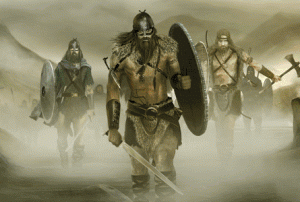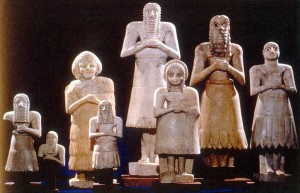E’en my father, mighty Odin, who is called all-powerful, doth lay no claim to supreme divinity…
—Thor, Avengers #171
Culture is religion externalized.
—Henry Van Til, The Calvinistic Concept of Culture (1959)

The Creation of Man
All of mankind has a basic internal “heart commitment” to someone or something. And that commitment shapes our values, our priorities, and our choices. When a nation or people share the same commitment, that commitment structures their society and creates their culture. All of us, whether we admit it or not… live in terms of the demands of our ultimate commitments. Our god not only defines good and evil for us (Gen. 3:5); but also defines our very reality.
The Triune God of Scripture, however, claims to be the only real and legitimate God. His claim is based on who He is. Eternal, self-existent, and sovereign. He is good. He is love. He is the Creator and Sustainer of all things. He made the world for His own glory, and one day He will call all men to account for their actions in His world. Of course, not everyone accepts His claims.
The Origin of Polytheism
Among humans, rejection of God’s claims began with our first parents, Adam and Eve, in Eden. When Satan first approached Eve and inquired about God’s directives, she answered that God had placed one tree off limits. If they ate the fruit of that tree, they would die. Eve understood that the prohibition and warning were wrapped up with God’s claim to be the sovereign Creator of the universe (the One who had created the Tree—and Adam and Eve—in the first place). But Satan told Eve, “Ye shalt not surely die” (Gen. 3:4). In other words, he told her that God isn’t who He claims to be.
Satan was offering Eve a new worldview, an alternative to God’s explanation of the universe and its origins. The premise is simple… if God could not carry out His threat concerning the forbidden tree, then there must be things in the universe beyond God’s control, things He never made. God might indeed be very powerful and dangerous, but He wouldn’t be the creator of heaven and earth if there were things more powerful than He. All His words would then be suspect. The universe might contain other forces as ancient as God and, in their own spheres, just as powerful, so that at many points they could defy God and overturn his decrees.
 What Satan was implying was a kind of polytheism, the existence and rule of many gods. None would be absolute. No true creators. Each would be limited in his own dominion by the dominion of all the others. This, of course, was the religious philosophy of the ancient world. Every mythology from Sumer to Scandinavia, from India to Mexico, echoed this view of its gods. A classic example of this sort of theology is found in 1 Kings 20:23. The Syrian army officers tell their king, “Their gods are gods of the hills; therefore they were stronger than we; but let us fight against them in the plain, and surely we shall be stronger than they.”
What Satan was implying was a kind of polytheism, the existence and rule of many gods. None would be absolute. No true creators. Each would be limited in his own dominion by the dominion of all the others. This, of course, was the religious philosophy of the ancient world. Every mythology from Sumer to Scandinavia, from India to Mexico, echoed this view of its gods. A classic example of this sort of theology is found in 1 Kings 20:23. The Syrian army officers tell their king, “Their gods are gods of the hills; therefore they were stronger than we; but let us fight against them in the plain, and surely we shall be stronger than they.”
No Other Gods…
The God of Scripture is well aware of the multitude of other “gods” that men worship and serve. It’s pretty clear He’s not impressed with rivals. When He came down in fire and thunder on Mt. Sinai and spoke His Ten Commandments, the very first imperative on the list was: “Thou shalt have no other gods before me” (Ex. 20:3). “Before me” is more literally, “before My face.” Yahweh was not saying, “I must be at the head of your pantheon.” He was saying, “You are not to have any gods where I can see them.” God sees everything, even the chambers of our imagination (Gen. 6:5; cf. Ezek. 8:12). He certainly sees all acts, public and private, our political debates, as well as the hard drives on our DVRs.
The first commandment rejects every kind of political or cultural polytheism. Yahweh demands that all men recognize His sovereignty, believe His word, and submit to His laws, privately and publicly. The commandment doesn’t recognize any dividing line between the religious and the secular. In fact, Israel’s confession, the Shema—what Jesus called “the first of all the commandments”—goes even further:
Hear, O Israel: The LORD our God is one LORD: And thou shalt love the LORD thy God with all thine heart, and with all thy soul, and with all thy might
(Deut. 6:4-5; cf. Mark 12:29-30).
There is only one Yahweh (LORD), and He is undivided and unconfused in His being. As a result, we are to love Him with undivided hearts and unconfused loyalty. We are to love Him in and from our hearts and with all our strength—with all our energies, passions, and skills. We are to love God in our hearts as well as our culture.
Multiculturalism and Religious Pluralism
Because men live in a God-created, God-structured world, their cultures will inevitably have some things in common. All of us eat and sleep; most of us prefer to live in houses of some sort; most of us recognize family as more than a biological phenomenon; all live beneath the same sun and stars. But every culture differs from every other culture in significant ways. These cultural variations have two very different starting points.
The first starting point is physical—variations in topography, climate, available food supply, and genetic inheritance and all that. The northern steppes and the equatorial deserts will obviously give rise to different kinds of architecture, clothing, and diet. Early on, the melanin content in our skin had a lot to do with our proximity to the equator.
The second source of cultural differences lies in ultimate religious commitments. Faith, ultimate concerns, radical allegiances—whatever we want to call it—shapes our fundamental decisions and attitudes. Beliefs about matter and spirit, marriage and family, life and death, morality and legality, all have their cultural fruit. Because of this, Christianity and Hinduism necessarily produce very different cultures. So do animism and Islam. We do indeed walk in the ways of our gods.
Practically and historically, any given culture is the product of both kinds of differences, and only God could possibly sort out and describe the interplay between the two over the history of the people involved. Within a culture, some artifacts and attitudes will obviously be the fruit of the religious cult; most will have an ambiguous origin and carry vague connections to the rest of the culture. Not every candlestick or skillet will testify explicitly to the religion of its maker; but its maker will most certainly have been explicitly as well as implicitly religious.

Sumerian Idols
When the children of Israel conquered the land of Canaan, they destroyed the idols and altars they found there (Num. 33:52). They kept the houses, wells, and vineyards (Deut. 6:10-11). In other words, they adopted some of Canaan’s cultural artifacts and eradicated others—the ones wrapped up in idolatrous worship. Paul made a similar distinction in his discussion of foods offered to idols. He taught that we can use the things of this world in obedience to God’s law and with charity, but we can’t use those things to worship idols or commune with demons (1 Cor. 8—10; cf. Rom. 14).
Like us, Paul lived in his multicultural age. The Roman Empire was the political and military fusion of hundreds of different cultures and religions. When Paul became an ambassador for Christ to that world, he adopted a policy of being “all things to all men” (1 Cor. 9:22). My guess is that he adopted the clothing, diet, and speech patterns of the people he was serving. To the Jews, he was “a Pharisee, the son of a Pharisee” (Acts 23:6); to imperial officials, he was a citizen of Rome (Acts 22:25ff). He quoted the Stoic poets at Athens (Acts 17:28), and spoke good Aramaic before a hostile crowd in Jerusalem (Acts 21:40). None of this violated his commitment to Christ. All of it forwarded the work of the gospel. And that gospel was a gospel of cultural transformation.
The Great Commission
Before Jesus ascended to heaven, He told his apostles and, through them, His Church:
All power is given unto me in heaven and in earth. Go ye therefore, and teach all nations, baptizing them in the name of the Father, and of the Son, and of the Holy Ghost: teaching them to observe all things whatsoever I have commanded you: and, lo, I am with you always, even unto the end of the world. Amen.
(Matt. 28:18-20).
In these verses, Jesus claims cosmic sovereignty. He commissions His Church to “teach” all nations. The margin renders this, “make disciples, or, practicing Christians of all nations.” In the Great Commission, Jesus envisions a world in which the worship of false gods has been supplanted by the worship of the true God. He foresees a world where every culture has been transformed by the gospel. He specifies the earthly means of this transformation: evangelism, baptism, and instruction. (No swords, no armies, no gunpoint conversions.) But the evidence of this transformation must ultimately be culture-wide. It must include marriage, family, education, agriculture, business, industry, literature, art, media, politics, and law. Here’s the deal: Every culture must serve someone or something. There are no neutral cultures… there are only religious cultures. It should be obvious that a Christian people would bring forth a Christian culture.
Conclusion: The New Jerusalem and the Nations
When John is shown the New Jerusalem in the closing chapters of Revelation, he sees the nations of the saved walking in its light (Rev. 21:24). That is, John is shown one trans-national, trans-temporal community consisting of all of God’s people in all ages. But he discerns within that community and within its influence distinct nations, peoples, and language groups (cf. Rev. 7:9). The kingdom of Christ doesn’t destroy all cultural differences. Instead, Christianity has an infinite number of valid cultural expressions. Hispanic Christian culture need not look like Irish Christian culture. Bantu Christian culture need not look like Korean Christian culture. We don’t all need to eat the same foods, wear the same sorts of clothes, or listen to the same sorts of music. Scripture does teach, however, that any true Christian culture will have blessings superior to its cultural rivals. Worship of the true God always bears better fruit than worship of false gods. Christian multiculturalism made our country great early on, and it’s the only way back to greatness today.
For Further Reading:
Steve Schlissel, Christian Culture in a Multicultural Age, Eight Answers Christ Has for Our Generation’s Questions (Brooklyn, NY: Messiah’s Bookshelf, 2003).
Henry Van Til, The Calvinistic Conception of Culture (Grand Rapids, Baker Book House, 2001).
Francis Nigel Lee, The Central Significance of Culture (N.p.: Presbyterian and Reformed Publishing Company, 1976).
David Bruce Hegeman, Plowing in Hope, Toward a Biblical Theology of Culture (Moscow, ID: Canon Press, 1999).
Gary North, Political Polytheism, The Myth of Pluralism (Tyler, TX: Institute for Christian Economics, 1989).
